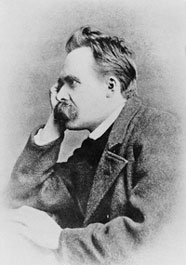The Lake House《触不到的恋人》(视频精讲之三)
(单词翻译:单击)
影片对白
 Simon Wyler: About the... the other day it was not a good moment. I was in a hell of a hurry.
Simon Wyler: About the... the other day it was not a good moment. I was in a hell of a hurry.
Alex: Of course. You've got some nice pieces here.
Simon: Oh, yeah. Music's fine, music helps. It's like Nietzsche says: "Life would be senseless--"
Alex: "Without music."
Simon: I guess I told you that, huh? Pour yourself a drink. Can you appreciate a good wine by now?
Alex: You bet.
Simon: You know, you'll have to forgive your father for being curious but where have you been all these years? I thought your Kerouac days were behind you.
Alex: I'm sorry, what?
Simon: What? Oh, you can come up, if you like.
Alex: What are you working on?
Simon: Oh, I'm just--I'm just remembering things. It's not such an easy job, let me tell you. Nor is it particularly innocent, in my case. Your father is writing his memoirs1.
Alex: Are we in it?
Simon: What do you think? Do you wanna be?
Alex: Do you?
Simon: Of course. You were all a part of your father's life.
Alex: Why are you talking to me in the third person?
Simon: Well, I--I don't--Because I'm writing about myself, I suppose. Why, doesn't it suit you?
Alex: I thought you might like these.
Simon: What are these? Something you've been working on?
Alex: No, they're--They're yours. From a house I just bought on the lake.
Simon: Oh, yes, I heard. They said some sleazy little condo developer had snapped it up. Oh, come on, indulge your father. Can't you take a little joke, for God's sake? Come on. Tell me. Where have you been? I really want to know.
Alex: I was trying to forget you. Or forgive you.
Simon: Did you succeed?
Alex: No. Let me know if you need any help remembering.
Simon: Oh, yeah, I will.
妙语佳句,活学活用
1. a hell of a
这是一个表示程度的表达,意思比较灵活,可以是“非常好的”或者“极恶劣的,让人受不了的”。如:
You did a hell of a job! 看看你干的好事!(这里是反语,表示让人受不了。)
18 is a hell of an age. 十八岁真的是黄金年华!
2. You bet!
口语中的一个常用的短句,意思相当于 Of course! 或者You are absolutely right! 当你完全同意别人观点的时候就可以使用这个表达。如:
--I think this movie really sucks!
--You bet!
3. snap up
If you snap something up, you buy it quickly because it is cheap or is just what you want.
抢购;抢先弄到手
e.g.: Every time we get a new delivery of clothes, people are queuing to snap them up.
One girl snapped up a pair of ancient style earrings2 for just $6.
文化面面观
Friedrich Wilhelm Nietzsche 尼采 (born Oct. 15, 1844, R?cken, Saxony, Prussia-died Aug. 25, 1900, Weimar, Thuringian States) German-Swiss philosopher and writer, one of the most influential3 of modern thinkers. The son of a Lutheran pastor4, he studied at Bonn and Leipzig and at age 24 became professor of Classical philology5 at the University of Basel. He became close to the older Richard Wagner, in whose operas he saw the potential for the revival6 of Western civilization, but broke with Wagner angrily in 1876. His Birth of Tragedy (1872) contained major insights into ancient Greek drama; like Untimely Meditations7 (1873), it is dominated by a Romantic perspective also influenced by Arthur Schopenhauer. Mental and physical problems forced him to leave his position in 1878, and he spent 10 years attempting to recover his health in various resorts while continuing to write prolifically8. His works from Human, All Too Human (1878) to The Gay Science (1882) extol9 reason and science, experiment with literary genres10, and express his emancipation11 from his earlier Romanticism. His mature writings, particularly Beyond Good and Evil (1886), A Genealogy12 of Morals (1887), and Thus Spake Zarathustra (1883-92), were preoccupied13 with the origin and function of values in human life. If, as he believed, life neither possesses nor lacks intrinsic value and yet is always being evaluated, then such evaluations14 can usefully be read as symptoms of the evaluator's condition. He fulminated against Christianity and announced the death of God. His major breakdown15 in 1889 marked the virtual end of his productive life. He was revered16 by Adolf Hitler for his dislike of democracy and his heroic ideal of the ?bermensch (Superman), though the Nazis17 perverted18 Nietzsche's thought and ignored much in it that was hostile to their aims. His analyses of the root motives19 and values that underlie20 traditional Western religion, morality, and philosophy affected21 generations of theologians, philosophers, psychologists, poets, novelists, and playwrights22.
(born Oct. 15, 1844, R?cken, Saxony, Prussia-died Aug. 25, 1900, Weimar, Thuringian States) German-Swiss philosopher and writer, one of the most influential3 of modern thinkers. The son of a Lutheran pastor4, he studied at Bonn and Leipzig and at age 24 became professor of Classical philology5 at the University of Basel. He became close to the older Richard Wagner, in whose operas he saw the potential for the revival6 of Western civilization, but broke with Wagner angrily in 1876. His Birth of Tragedy (1872) contained major insights into ancient Greek drama; like Untimely Meditations7 (1873), it is dominated by a Romantic perspective also influenced by Arthur Schopenhauer. Mental and physical problems forced him to leave his position in 1878, and he spent 10 years attempting to recover his health in various resorts while continuing to write prolifically8. His works from Human, All Too Human (1878) to The Gay Science (1882) extol9 reason and science, experiment with literary genres10, and express his emancipation11 from his earlier Romanticism. His mature writings, particularly Beyond Good and Evil (1886), A Genealogy12 of Morals (1887), and Thus Spake Zarathustra (1883-92), were preoccupied13 with the origin and function of values in human life. If, as he believed, life neither possesses nor lacks intrinsic value and yet is always being evaluated, then such evaluations14 can usefully be read as symptoms of the evaluator's condition. He fulminated against Christianity and announced the death of God. His major breakdown15 in 1889 marked the virtual end of his productive life. He was revered16 by Adolf Hitler for his dislike of democracy and his heroic ideal of the ?bermensch (Superman), though the Nazis17 perverted18 Nietzsche's thought and ignored much in it that was hostile to their aims. His analyses of the root motives19 and values that underlie20 traditional Western religion, morality, and philosophy affected21 generations of theologians, philosophers, psychologists, poets, novelists, and playwrights22.
考考你
用今日所学将下面的句子译成英语。
1. 这辆摩托车真是棒极了!
2. -你真打算去西藏吗?
-那是当然!
3. 要是有什么便宜货,她就去抢购。
The Lake House《触不到的恋人》(精讲之二)考考你 参考答案
1. 我将来一定要投身于科学事业。
I will dedicate myself to science in the future.
2. 她这个人就是有点怪的。
She is kind of weird23.
3. 你们应该每天早上八点半之前到教室。
You are supposed to arrive at the classroom in 15 minutes.
 收听单词发音
收听单词发音 



